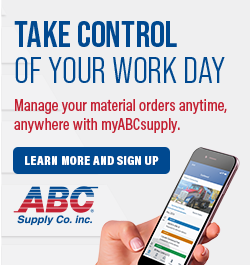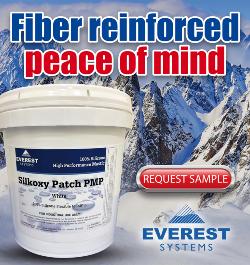Stories From the Roof - Tim Brown - RGS Exteriors - PODCAST TRANSCRIPTION
April 2, 2023 at 6:00 a.m.Editor's note: The following is the transcript of a live interview with Tim Brown Jr. from RGS Exteriors. You can read the interview below or listen to the podcast.
Megan Ellsworth: Welcome to Stories From The Roof, from rooferscoffeeshop.com, where we tell the stories of roofing professionals from around the globe.
Hello. Welcome to Stories From The Roof. My name is Megan Ellsworth, and today I'm here with Tim Brown. So excited to have you here, Tim. Why don't we start by having you just introduce yourself, the name of your company, what you do at the company, and how long you've been in construction?
Tim Brown: It's great. Love it. Well, first of all, thanks for having me. Appreciate you guys and what you do and for our industry, it's awesome. But yeah, like you said, I'm, I'm Tim Brown, Jr. RGS Exteriors is our company. We do everything on the outside of the home, ironically, except for roofing, but siding, rain gutters, soffit, fascia, stone, stucco, anything on the outside of the home. I have been in the business since I was a little kid. I'm actually a fourth of five generations.
Megan Ellsworth: Wow.
Tim Brown: That's kind of cool. Not too many people do that. We're either really smart or really dumb. I'll let you decide what that is. But no, we've been doing it for a long time. So I have four kids and all four of my kids in the summertime. More, of course, I have two in college and then two in high school. So when they're not in school, they're working for the company. So they're the fifth generation.
Megan Ellsworth: Wow.
Tim Brown: Our family's been doing it for a few years.
Megan Ellsworth: That's amazing. So when did the company start?
Tim Brown: So my great grandpa started doing exterior works back in the fifties, forties and fifties, and then my grandpa and then my dad, and then now me and the kids.
Megan Ellsworth: And where are you all based?
Tim Brown: Yeah, that's a great question. So we're out of Salt Lake City, the Salt Lake Metro area, so Utah in what we call the Wasatch Front.
Megan Ellsworth: Okay. Okay, cool. I just went camping at the Salt Flats this summer in Bonneville. So cool.
Tim Brown: It is kind of stinky out there, but it is cool.
Megan Ellsworth: Totally. Yeah, totally stinky.
Tim Brown: [inaudible 00:01:58] but it's awesome. It's a great place.
Megan Ellsworth: Okay, so let's continue with having you tell us just about how you got into the company, what brought you in besides being the fourth generation, and what has your career been like?
Tim Brown: What brought me in really, I mean, it was my dad, right? It was that when I was a kid, I had to work. My dad, to his credit, taught me and all my siblings how to work, and it was, "Hey, this is a job." He told me hundreds of times, "I'm not teaching you and giving you a career. I don't want this to be a career for you. I want you to just learn how to work." He didn't want me to do this. He always wanted, "[inaudible 00:02:33] but I always want you to do better than us. I want you to do something else."
But as I worked in the industry, I fell in love with it. And then I went to college, went to a pretty good business school, and while I was in there and I graduated with my undergrad, I had some decisions to make, where to go, what to do. I had some pretty good opportunities outside of the family business, but ultimately decided to partner up with my dad at that point in time. And we kind of worked things out where I could be an owner very quickly. And so basically went that path and stayed in the business and then now really run the company.
Megan Ellsworth: That's cool. Do you have siblings and do any of them work for the company?
Tim Brown: Yeah, so at one point in time all of them have, but none of them do now.
Megan Ellsworth: Okay.
Tim Brown: So my two sisters are just stay-at-home moms. They have the opportunity to stay home with their kids, which is awesome. Then my brother sometimes works occasionally for us in the summer, but he's a school teacher and decided to go that direction, and so that's what he's doing.
Megan Ellsworth: Awesome. Very cool. Besides your dad, who taught you about exteriors? Or if it's just your dad, that's cool too.
Tim Brown: Well mean, yeah, really since it's been a family business, I mean, I learned from my dad, but I think a lot of- My dad taught me everything to know about rain gutters. And my dad is probably the most experienced, knowledgeable, rain gutter installer in maybe even the country. He's literally been in the business for 50 years.
Megan Ellsworth: Wow.
Tim Brown: Over 50 years, and he's focused on rain gutters that entire time. So he taught me everything there was to know about gutters. Now, the siding and those other aspects I probably had to learn as we went. My grandpa and great grandpa did full exteriors, but then in 1990 we transitioned to just rain gutters, and that's all our company did for about 20 years. And then about 2010-ish is when we went to the full exterior realm. And so when we launched that division, really just learned it by the school of hard knocks.
But also too, one thing that I really try to do and something that I pride myself in is surrounding myself with good people. And so we've hired really good people that know that industry. About three years ago, we saw a need for stucco in our market. That was a niche, but I don't know anything about stucco. So we went out and hired somebody that knows how to run a stucco division and brought them in to manage that. And so that's been the way we've gone with all of our products.
Megan Ellsworth: That's really cool. It's cool to see owners of companies that are able to step back and say like, "Hey, I know nothing about this and I'm going to hire someone that does know something, because I feel like that's just best practice for the company." So it's cool. That's really cool.
Tim Brown: For sure. And I think the reason and the way we've been able to grow and develop as a company and become better is that I've got really good people that are on the right seat of the bus.
Megan Ellsworth: Love it.
Tim Brown: There's something to be said about getting the right person, but it's also getting you on the right seat. And we've had people in our company and the right people. They're a fit, we want them, but they weren't a fit on that particular seat. So we've had to make some changes and make some adjustments, and those decisions are never easy to do and they're never fun. But if you can get everybody on the right seat, on the right bus, or excuse me, let me rephrase that. If you can get everybody on the bus first and then get them on the right seat on that bus, it's a much better and much more productive.
Megan Ellsworth: Absolutely. Absolutely. So what are some of the most valuable lessons you've learned throughout your career?
Tim Brown: That's a really good question. I think the first thing was what we just talked about, hiring the right people and getting them in the right thing. And the other thing too, to go along with that, and this is really important, and something I didn't do well at first, is not micromanage. If you feel like you've got the right person, let them run with it and let them run their department. The last thing you can do is micromanage and over-manage. All that's going to do is frustrate them. It's not going to benefit anybody.
And so that's something that I think was a huge lesson that I had to learn early on. I failed miserably at first, but as we grew and as we continue to get bigger as a company, I had to learn to let people do their jobs and let them fail. Sometimes that's not easy to do. Now, certainly don't let them fail to the detriment of the company where it's going to cost you thousands of dollars, but sometimes you have to let them fail and cost you some money because they're going to learn and you're going to learn and you're going to be better. So that would be probably the first thing.
The second thing I'm really big, and then that's actually really where I met you guys and got more involved with you is through organizations like Certified Contractors Networks, CCN or other organizations like that. Get involved and learn and grow. I budgeted a good chunk of our yearly budget for travel and for conferences, not just for me, but for my team. I'm somewhere, it seems like, in the country a couple times a month, and why? So that I can learn, so I can grow, so I can get better. But also the team. And as we continue to grow and learn and do that in organizations like CCN, you're able to do that and get that learning curve quicker.
So I don't know if that answers your question, if that's kind of long-winded, but that gives you some things that have been really good for me.
Megan Ellsworth: Yeah, no, that was great. And I think that's really good advice for other people that are listening too and really getting involved. And since you're not doing roofing, you're getting involved in other associations like CCN and all those things. That's really cool. And it's such an important thing to be continuously learning and keeping our brains tight.
Tim Brown: And I think what's really cool is that though we may not specifically do roofing, and this is Roofers Coffee Shop, and you're like, "Well, why? What's the connection?" Well, look, I think it's very valuable. We're all in the same industry.
Megan Ellsworth: Precisely.
Tim Brown: And whether I do roofing or not, we have the same issues. We have the same problems. So listening to your guys' podcasts and perhaps another roofer listening to this, we still have the same issues and we are all going through the same problems. And so I think that it's really valuable to have that. And I guess one thing maybe to add from before to not only go to those conferences, but put yourself out there and get to know people and network. Anytime I have an issue or a problem, I pick up the phone of somebody in our industry. It could be a roofer, it could be a window installer, it could be a full in interior remodeling company, but they still have the same problem. So call them up, ask questions, "What do you do in this situation? How do you handle this?" And getting those relationships and having those relationships really are extremely valuable and frankly, get us where we need to be.
Megan Ellsworth: Yeah. So well said. So true. Kind of going off of that, what we were talking earlier about making sure everyone's on the right seat on the bus, what is the most important trait for an employee or a coworker in your opinion?
Tim Brown: That's a good question, and I think it depends on the position. I think if it's an office staff, it's someone that's prompt, someone that shows up on time, someone that's personable. I think if it's an installer, it's somebody that's loyal, someone that works hard, and someone that sees a value in what you bring. I think with our company is we want the best of the best, but there's a very high standard. But because of that, we also pay the best. And so I think that's a valuable trait that we want for foreign installers. And then if it's my office staff, or excuse me, my management or production level in that regard, I think it's somebody that's a team player, someone that will work hard, that will put someone else's needs above their own. And I think that's something that we preach a lot in our company is our culture. We want people that want to be there. We want to have people that want to help out. And it's amazing and really powerful to watch that. And when you see somebody helping somebody else, it's awesome.
Megan Ellsworth: Yeah, I bet. Yes. Like heartwarming total full circle moment. I love it.
Tim Brown: Exactly.
Megan Ellsworth: If you were to go back and start at the beginning of your career, what would you do differently?
Tim Brown: I don't know.
Megan Ellsworth: Yeah.
Tim Brown: I love what I do. I think I would learn early to go back to the thing, to not micromanage. And I think one thing that I've learned that I'm not good at is hire slow and fire fast. And I'm not good at that. I'm terrible at that. I hate letting people go. It is the hardest thing in the world to do, but I think when you make key decisions hire slow and fire fast.
Megan Ellsworth: Oh my gosh. For everyone listening, when this comes out, that's like a noteworthy, fridge-worthy little quote. That's so smart. I love that.
Tim Brown: Right, I wish I'd follow my own advice.
Megan Ellsworth: Yeah.
Tim Brown: But it's so true.
Megan Ellsworth: So true. Yeah, I love that. I've never heard that before. That's a really great piece of advice there. So what's the best thing you've ever done for your business or career?
Tim Brown: Man, I keep going back to the same thing.
Megan Ellsworth: I know, yeah, I love it.
Tim Brown: But I think it's true. I think it's that getting the right people on the bus again.
Megan Ellsworth: Yeah.
Tim Brown: I mean, having the key people do the work. When I first started and I first started partnering up with my dad, I did everything. I was still installing. I would sell, I would manage, I'd manage the team, and I had 500 hats on. Like many of us do. The problem is, is I think you can do that, and I think you can be successful at a certain level, but if you want to take it to the next level and you really want to get to that point where you don't want to install anymore, you've got to learn to let go. And that's something that is not easy to do. But once you do that, and once you can figure that out, it's magic.
I still work very hard. I still love doing what I do, and I still put in a lot of hours. But I'm to the point where if I literally could leave my company for two months and it not be an issue, simply by a couple check-ins on emails or some calls or texts, and that would be all I would be required to do. Because we've got such a good key management and such a good company that runs independently of me. I guess to sum it up is I had to learn to work on the company, not in it, and as soon as I can work on the company and no longer in it, that's when the true growth happens, that's when the true profit happens. And truthfully, you're so much happier.
Megan Ellsworth:Wow. Well said. Yes.
If you love conversations like Stories From The Roof, you're going to love Roofers Coffee Shops' Coffee Conversations. This insightful series is now in its fourth season and features guests that talk all about what is important to the roofing industry and even delves into topics no one else is talking about, like diversity, equity, and inclusion, as well as pride month. Listen to these hour long conversations live on the second and fourth Thursday of each month, or on demand at www.rooferscoffeeshop.com.
Who's the best boss you've ever had?
Tim Brown: So you know what? It's funny you ask, I've literally had one boss my entire life, and it was my dad. And he tells me all the time, he's like, "Look, you're not as good of a boss as you could be because you've only had me. You didn't experience it." So I truly, I've literally only had one job my entire life. Since I was 14 years old, I started doing this. So over 30 years I've been in this industry and literally my dad has been my only boss.
Megan Ellsworth: Honestly, that's awesome.
Tim Brown: It's good and bad, right?
Megan Ellsworth: Yeah, totally. It has its ups and downs, but that's pretty cool.
Tim Brown: Yeah.
Megan Ellsworth: So I love this question. This is my favorite one that we ask in this podcast, and it is what makes you smile when you think about your job?
Tim Brown: Wow, that's an interesting one.
Megan Ellsworth: I know. I love it.
Tim Brown: You know what, and it's funny because I was at a conference last week and it was all about profitability and putting profit first and always focusing on that. And so initially I want to say, well, I smile when we're making money, 'cause money. And that's true, but that's so surface. That's not deep. I think truly, and I'm not good at this, but I'm working on it, and this was a big takeaway from last week for me, is that I need to look at the small wins that we've gone.
Sometimes you get in the thick of things and you look and you're kind of unhappy and you're like, "Man, we haven't reached our goals. We haven't done the things we needed to do or we wanted to do this year." But if you step back and you look at all the little things that you have accomplished, and how big, and how good they are, man, now you can put a big smile on your face and go, "Man, we really killed it this year. We accomplished so much." But when you're in the thick of it, you don't feel like that. So I think that's one.
I think the second thing is seeing when you entrust managers and key people with the keys to the kingdom, lack of better term, when you give them that responsibility, but also the authority and they take it and they run with it. Oh, that's powerful. That's awesome. And that's when you smile, and that's when you're happy is when what you've worked so hard for, you start to see happening.
Megan Ellsworth: Yeah. You're seeing everything come into fruition. That's great.
Tim Brown: And the other thing too, just simple things just because I've done this my entire life, I'm very unique. I realize that, but because I've done it, that's all I've ever done, I love this industry.
Megan Ellsworth: Yeah.
Tim Brown: It's something I've done my entire life and I enjoy it. I love it. There's a passion for it. And honestly, I want not only myself to make a good living, but I want every one of my employees, every one of the installers. And I think it's our responsibility, but also our privilege and honor as owners of companies to do that, to make it so that your installers can make a really good living, so that they can be comfortable themselves. And once you do that and you see that and you see those big bonuses... I mean, look, it's never fun to write a big bonus check, but when you do and you're handing those out, and then it's awesome.
Megan Ellsworth: Yeah, seeing the smile on their face makes you smile.
Tim Brown: Sure.
Megan Ellsworth: And seeing them being comfortable and flourishing in their home life. Yeah, absolutely.
Tim Brown: Yeah. It's great.
Megan Ellsworth: Well, we only have two questions left, and this is our second to last one. Any tips for new people starting out in roofing or construction or exteriors?
Tim Brown: I think everything you say, it all applies. It's exactly the same, right?
Megan Ellsworth: Yeah.
Tim Brown: And I think the first thing is ask for help. Don't be too proud and too stubborn, "I'm good. I know what I'm doing." Yes, you do. But ask. Surround yourself with good people, people that you can network with, people that you can have a helping hand. There's a lot to be said about it's not what you know, but who you know. Well get to know those people. And as you develop those relationships with those types of people that are going to help you, use them. But don't abuse them though, right? I mean, that's the other thing, is have it be a win-win. Help them out and don't ask for help. I'll give you a small example of that. Our local Home Builders Association. I first joined that organization frankly because I wanted work.
Megan Ellsworth: Yeah.
Tim Brown: That's why I joined and it was a selfish aspect. And guess what? I got absolutely nothing out of it for three or four years. It was finally when they asked me if I'd be on the board of directors there, is when I really understood and I had the magic because now I'm serving and now I'm putting others' needs above my own. And then all of a sudden, you develop these relationships and trust with people and they trust you. And we ended up getting more work out of that than I could have ever dreamed of.
Megan Ellsworth: Wow.
Tim Brown: But it's people. I put other needs first. So anyway, so that's the first thing is surround yourself with good people. But the second thing is work on your business, not in it. As quickly as you can. Look, when you're first starting, you're probably going to be doing everything.
Megan Ellsworth: Yeah.
Tim Brown: You're the secretary, you're the office manager, you're the sales manager, you're the sales, you're everything. But as quickly as you can, grow and get people in the right place. And then I guess a third aspect or 2B would be to hire a really good salesperson or a sales team. Too many times we try to do it ourselves. And frankly, if you're an owner of a company, if you go to the DiSC profile, you're probably high D personality. Well, high D is not necessarily a good salesperson. Hire a good salesperson. Let them go sell and let you manage and work everything else. And I think if you can start off that way, you can really grow and build your business.
Megan Ellsworth: Absolutely. Absolutely. Well, thank you for that wisdom. I hope everyone listening was taking notes because that's-
Tim Brown: I don't know know about that, but we'll try.
Megan Ellsworth: ... so true. You should be taking notes. This is good stuff. Okay, well last question. How long have you been following Roofer's Coffee Shop and what's your favorite thing about RCS?
Tim Brown: I've just recently got much more involved, right, with the podcast and doing other things and being involved now on a much deeper level. But I've been following Roofer's Coffee Shop on Facebook for years. I don't know how I came across it, but I did. And I just had the opportunity to just really fall for the cool pictures that you guys put on there. And then this cool story. I loved it. There was always really good things on there. And I thought that the Facebook page was very well done. And so that actually intrigued me. And what was really cool about it is following that, I liked it.
And then I had the opportunity to meet Heidi actually in two instances. One, at a Certified Contractor's Network, and also through the remodeling contracting circuit with Patrick [inaudible 00:19:20]. Seeing those things and seeing the value of it, I really wanted to get involved and be involved because I love what you guys do for the industry, for the roofing and the construction industry, but more importantly, what we can do to help businesses grow and develop. So anyway, really long answer, but I love it and I love what you guys are doing.
Megan Ellsworth: Yay. I'm so glad. I'm so that we can be of service to the industry and to everyone and to you. So thank you so much.
Tim Brown: Love it.
Megan Ellsworth: This has been a fabulous conversation. I hope you had fun. I had fun. Thank you so much for chatting with me today.
Tim Brown: Hey, look, it's absolutely my pleasure. And one thing that I've learned a long time ago is that, and I'm certainly not there, I've got a long way to go, but we're growing and we're getting better every day. But one thing I've learned is that as you start to be successful and you start to develop and get good traits, and also as you're able to have good employees run the company for you, then it becomes your obligation, your privilege, and honor to do these types of things. And so anytime I can help anybody in the industry, I want to. Feel free to give out my number, give out my email. Anytime, any place somebody can call me. And I always put that as a priority because I feel like it's my responsibility, frankly, to help others in the industry. And if I can help at all I want to, because frankly, I've had that happen so many times to me. And so now it's my turn.
Megan Ellsworth: Yay. Yes.
Tim Brown: Love it, love it.
Megan Ellsworth: Love it. Thank you so much. This has been Stories From The Roof with Tim Brown, Jr. Thank you so much. This has been great. Fabulous.
Tim Brown: Thank you. Thank you so much. Appreciate you guys and have a wonderful day.
Megan Ellsworth: Thanks for listening to Stories From The Roof from rooferscoffeeshop.com. Make sure to subscribe and leave a review.
























Comments
Leave a Reply
Have an account? Login to leave a comment!
Sign In